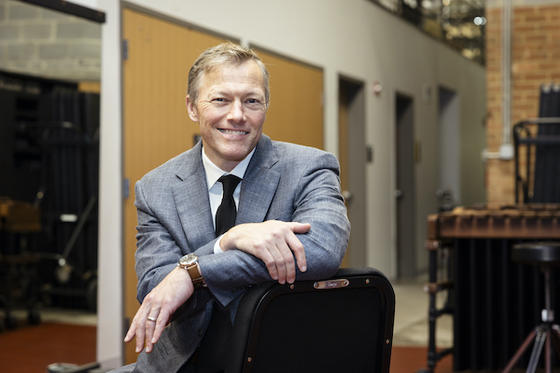George Mason University’s annual Roger Wilkins Lecture is a tribute to the late Robinson Professor Emeritus of History and American Culture, and Wilkins’ daughter, Elizabeth, was on hand Tuesday, Sept. 26, at the Harris Theater to introduce this year’s guest speaker, Pulitzer Prize-winning author Matthew Desmond.

“After reading both of [Desmond’s] books, I have come away with a sense of a person whose passion for justice and whose hatred for injustice paralleled that of my dad,” she said. “Both men have relentlessly centered people—real people, disempowered people, poor people—in their work. Neither of them will let us look away.”
The lecture, attended by about 325 people, featured Desmond’s latest book “Poverty, by America.” Desmond spoke about his personal experiences with poverty throughout his life, his encounters with others affected by social-economic injustices such as eviction, and implementable government policies that could greatly decrease the number of families and individuals living in poverty.
The lecture is sponsored by the Philosophy, Politics and Economics (PPE) Program, a collaborative effort between the Schar School of Policy and Government and the College of Humanities and Social Sciences.
The final portion of the evening consisted of a Q&A run by Wendi Manuel-Scott, professor of integrative studies and history, and a book signing by Desmond.
One audience member asked whether mission-focused nonprofits and co-ops that are not focused on maximizing profits could help solve the housing problem.
Desmond said that it’s possible but challenging, and it would require federal guidance for wide implementation. He gave the example of a tenant union in Minneapolis that was trying to turn their buildings into a co-op and asked the landlord to sell them the buildings. He set the asking price at $7 million. They countered with a fair market price.
“But [the landlord] got fed up because the tenants were also advocating, so he gave everyone an eviction notice. Everything came to a head—they were either going to be homeowners or homeless,” Desmond said. The tenants ultimately won and bought the buildings, and they are still a co-op today, he added.
Another audience member asked why the top 1% don’t pay their fair share of taxes, which would go toward $175 billion estimated need to end poverty?
“One is the worry that if you tax affluent Americans too much, they will leave the country, so instead of having a little tax from them, we’d have none,” Desmond said. He also pointed to fears of empowering the Internal Revenue Service, an already troubled institution. “Some propose a whole new federal agency, that would essentially be a ‘making sure rich people pay their taxes’ bureau, and if you make under a certain amount, the bottom 95%, they will have absolutely nothing to do with you.”
Desmond was also asked about the challenge of national rhetoric interfering with practical local problem-solving movements.
“I think that polarization is both very frustrating and encouraging,” Desmond said. “Surveys show that most Americans think that minimum wage is too low, the rich aren’t paying their fair share of taxes, and most Democrats and Republicans believe that poverty is the result of structural failing, not a moral failing. That’s encouraging.”
“The call for a robust antipoverty movement means we might disagree on gun rights or abortion, but we both want higher wages and fairer taxes,” he added. “That kind of movement is harder to make in America.”
“Poverty isn’t simply the condition of not having enough money. It’s the condition of not having enough choice and being taken advantage of because of that.”
—Matthew Desmond
Related News
- September 23, 2025
- September 27, 2023
- September 6, 2023
- February 28, 2023
- April 6, 2022
